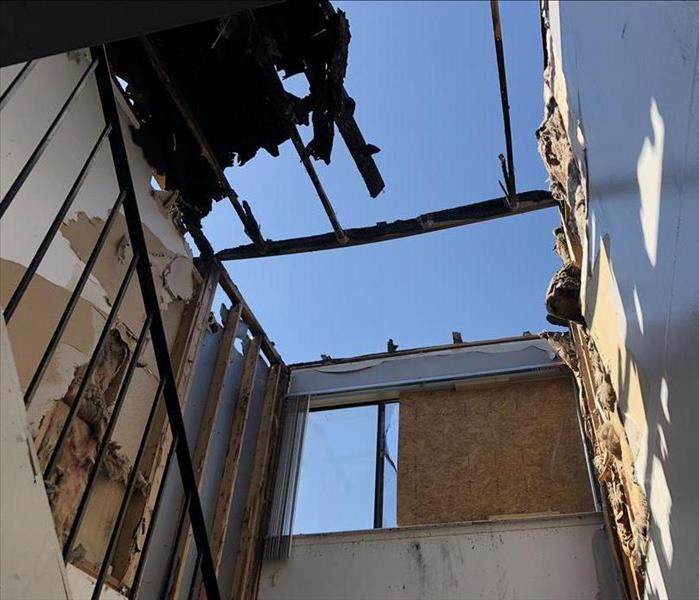House Fire Checklist: What to Do and What Not to Do After a House Fire
10/11/2021 (Permalink)
A house fire is a terrible event that can unsettle homeowners both physically and emotionally. It is one of the commonest disasters in the USA. There has been a lot of information on how to prevent house fires. That is because it is better not to experience it in the first place. But since house fires are rampant, there is a possibility that you may encounter one.
No matter the size of the house, fire outbreaks are possible. That is because several factors expose every home to a house fire. The common causes include:
- Electrical cables and equipment: It could occur following a malfunction from the wires deep inside the walls, an overloaded power point, faulty electrical appliances, frayed cords, inadequate wiring, and poor use of power point extension cords.
- Candles: Candles can cause fire outbreaks in the house if you use them poorly.
- Cooking equipment: Cooking equipment like pans and pots can lead to fire outbreaks if they overheat.
- Flammable liquids: Flammable liquids like methylated spirits, petrol, or kerosene can cause a house fire if they are close to heat sources.
- Heating: If you have a portable heater or furnace close to curtains, clothes, furniture, or laundry, they can lead to fire outbreaks.
- Children: Out of curiosity, children can set things on fire to see the effect.
- Smoking indoors: The butt of cigarettes can stay lit for a long time. If you do not put them off completely, they can ignite fire once they contact flammable materials.
Because of the emotional events that homeowners go through, they may tend to do things that will worsen the situation, warns Nelson PM. For that reason, this article aims to help you stay coordinated and prevent mistakes that can affect your insurance claims or expose your household to danger.
Below is a checklist of what to do and what not to do after a house fire.
What to do after a house fire
Ensure that your family is safe. Stay calm and reassure them. Check for signs of injuries on yourself, family members, and pets.
- Get a safe place to stay. Irrespective of the level of damage, you should not remain in that house.
- Contact your family and friends to inform them about the house fire. Also, reassure them of your safety.
- Contact your insurance company. Inform them about the fire outbreak and only give answers to the questions you know. Start the claim process to help address your needs. The insurance company will provide recommendations for restoring or cleaning up the property. They may also help to secure the house.
- Secure your home to protect it from unlawful entry and terrible weather even when it is damaged.
- Contact the local police department to inform them about the event. Doing this will help protect the house from looting since it is vacant.
- Contact utility providers to inform them about the fire so that they can temporarily shut off utility supplies to you.
- Get a copy of the fire report from your local fire department, read the summary, and file it. Your insurance company will find it valuable.
- Call a restoration company to assess the property. After a fire outbreak, the damages do not stop. For that reason, it is essential to get a restoration company early. Doing so will prevent further damage to the property.
- Get permission from the fire department to access the property. With that, you can take photographs and also note the level of damage. The restoration company should be present while you are doing this to prevent further damage.
- Create and keep a record of your belongings. Note the damaged and undamaged items. Do not dispose of damaged items yet.
- Retrieve all valuables such as passports, identity cards, certificates, licenses, financial records, medical records, and prescription drugs. Note that you are only retrieving the prescription drugs so that you can get a replacement.
- Keep up with financing your mortgage even after the house fire. Your insurance company will handle your losses.
- Notify your children’s school to let them know the situation your kids are going through.
- Notify the post office so that they will know whether to hold or forward your mails.
- Commence a replacement process for vital documents that were damaged by the fire.
What not to do after a house fire
- Do not gain access to the house without permission from the local fire department.
- Do not enter the house except you are fully kitted with personal protective equipment.
- Do not consume food items or drugs that were exposed to the fire.
- Do not use items that were damaged by the fire.
- Do not turn on any utilities until you are sure that they are safe.
- Do not attempt to wash or clean off the fire residue by yourself. Let professionals handle it.
- Do not attempt to start any vehicle that was damaged by the fire.






 24/7 Emergency Service
24/7 Emergency Service
